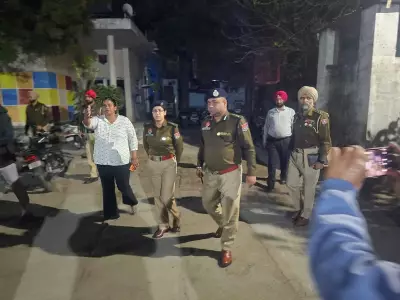
In a significant development that has sent ripples through Punjab's political landscape, controversial Sikh preacher Amritpal Singh finds himself facing serious charges under the Unlawful Activities (Prevention) Act. The case centers around his alleged support for jailed gangster Deep Sidhu during the recent Tarn Taran by-election.
The Controversial Figure Behind the Headlines
Amritpal Singh, who emerged as a prominent religious figure in recent months, has been making waves with his radical rhetoric and growing influence among certain sections of Punjab's youth. His sudden rise to prominence and increasingly confrontational stance had already drawn the attention of security agencies before the current legal troubles began.
The Bathinda Connection: Gangster Politics
The case took a serious turn when investigations revealed Amritpal Singh's alleged connections with Deep Sidhu, a notorious gangster currently incarcerated in Bathinda jail. According to authorities, Singh actively campaigned and mobilized support for Sidhu's political ambitions despite the gangster being behind bars.
"The evidence suggests a deliberate attempt to influence the electoral process through unlawful means," revealed a senior police official familiar with the case. "When you have a radical preacher supporting a jailed gangster's political ambitions, it creates a dangerous mix that threatens both security and democratic processes."
UAPA: The Serious Implications
The invocation of UAPA marks a significant escalation in the legal battle against Amritpal Singh. This anti-terror legislation allows for extended detention without trial and carries severe penalties, indicating that authorities view his activities as going beyond ordinary political campaigning.
Security analysts point to several concerning aspects of the case:
- Alleged attempts to radicalize youth under the guise of religious preaching
- Connections between religious extremism and criminal elements
- Potential threats to the electoral integrity in Punjab
- Possible links to broader anti-national networks
Political Fallout in Punjab
The timing of these developments is particularly sensitive given Punjab's volatile political environment. The Tarn Taran by-election had already been contentious, and the emergence of this case has added another layer of complexity to the state's political dynamics.
"This isn't just about one individual or one election," notes a Chandigarh-based political analyst. "It reflects deeper concerns about how radical elements and criminal networks might be attempting to influence Punjab's political future. The state government's response to this case will be closely watched."
What Comes Next?
As the National Investigation Agency likely prepares to take over the case, all eyes are on how this high-profile matter will unfold. The coming weeks are expected to see:
- Intensified investigations into Amritpal Singh's network and funding sources
- Scrutiny of his connections with other radical elements
- Possible arrests of associates involved in the alleged activities
- Political reactions from various parties in Punjab
The case represents a crucial test for both state and central authorities in dealing with the intersection of religious radicalism, criminal activity, and electoral politics. As developments continue to emerge, this story remains one of the most closely watched security and political narratives in contemporary Punjab.






